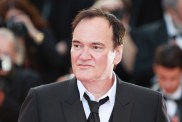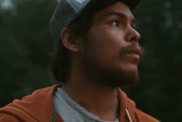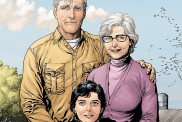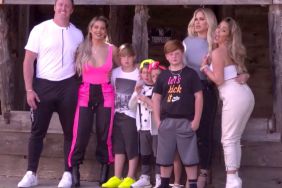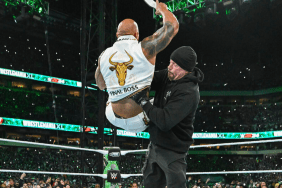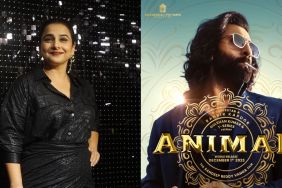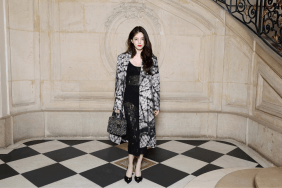You can tell that Ashley Judd is really on as she shows up a half hour late for the press conference for her new psychological thriller Bug, directed by the legendary William Friedkin. She’s fully made-up, wearing the type of outfit the paparazzi love and sure enough, there’s even a set-up in the back of the room for the sake of a couple dozen shutterbugs (no pun intended) to get a couple shots before she starts answering questions. It’s a very different vibe from when Judd appeared in a similar press conference on the other side of the Regency lobby for Joey Lauren Adams’ Come Early Morning, a smaller and more intimate affair with far less testosterone in the room.
In the movie, Judd plays a cocktail waitress in hiding from her recently paroled ex-husband (Harry Connick Jr.) who gets involved with an ex-soldier (Michael Shannon) who claims to have been the victim of government experiments, creating enough paranoid tension to make her believe she’s part of that experiment. What is being dubbed “the most disturbing horror film ever” by a number of journalists is actually based on an off-Broadway play by Tracy Letts, who adapted it into a screenplay.
Fortunately, Judd has William Friedkin and her co-star Michael Shannon to run interference from all of the usual annoying questions she must get from press, though there’s plenty of those left here as well, beginning with an oldie but goody
ComingSoon.net: What made you choose this role?
Ashley Judd: It was very easy for me to decide to do “Bug.” Billy [AKA William Friedkin] had been good enough to send the script to my agent. “Bug” also had in common a producer who was producing “Come Early Morning,” which is the film I shot right before “Bug,” so there was a streamlined simplicity to the process. Of course, Billy’s wife was my mentor early in my career and really provided my big break in Hollywood, so it seems like there were a lot of auspicious things that were coming together around the script. I really loved Billy’s response to Michael; he was very clear, impassioned and firm that Michael was the actor for the film, as he had been unabashedly the actor for the play. I was really impressed with how Billy was just not willing to negotiate around that and helped me be very comfortable talking with the financier of the film about how Michael was also who I would want to play with in the movie. So, there was just a lot that I really liked; there was a good backbone and positive energy surrounding the project. My agent, when she sent the script to me to read, she said, “You know, you might not want to go there
” and immediately that intrigued me. I don’t think she was intentionally using reverse psychology, but that’s the effect it had, and I think I became willing to take the part on before I had, in fact, read it. There is a part of me that gets really competitive with my own creativity; like, “Oh? You think I can’t do it? Really? OK
” (laughs) I was always attracted to very intense stuff as a child. In fact, I think, when I was little, I wanted to grow up and be intense, my mission in life. (laughs) I thought that the characters were extremely real, very grounded, clearly wounded, very lonely people with a lot of dark secrets that they feel compelled to protect, and all of the insanity and unmanageability that comes out of those kinds of secrets and what it takes to keep those secrets.
CS: Did you feel you had a disadvantage going into this movie because you hadn’t done the play?
Judd: I felt I was at a real advantage because Michael (Shannon) clearly knew the material inside and out and had a very well-developed and evolved relationship with the material. Billy had seen it; he responded so passionately and immediately began acquiring the rights, so there was a tremendous enthusiasm and respect there and I felt I was able to just slip-stream in there.

CS: What did you think of the sets?
Judd: I really loved that this little set was built inside a high school gymnasium in Metairie, Louisiana, and we had the opportunity to go to the gym while the set was being built and the props were being chosen. A lot of the set design wasn’t complete yet, and they wanted us to let the space reflect our organic relationship with our characters. (To Friedkin) Remember how it was really messy at first and I was like: “Excuse me! I’m not a slob! I’m a loner, but I’m not a slob!” It was a hovel at first, and so we were in there a couple of days beforehand and we cleaned all of that out. I was able to very carefully edit and choose, personally select everything in the room and that was pretty neat, so the rehearsal was more about the feel and tone of the character in the film, then when it came time to shoot, we did our job.
CS: Even though this was already a well-established play, were there any changes you asked to be made in the script to make you more comfortable with the character and did you have any worries about the film not living up to the success of the play?
Judd: No. No, no, no! That’s the excitement and the challenge. Like “Wow! How do I get myself from where I sit right now, with what I know and how I feel to what the character does and feels on the page and in the very three-dimensional and dynamic performance?” The process for me is simply about surrendering and being really willing. I would sit around before I went to Louisiana to do the film and joke with my sister and give a funny, off-hand summary of the film, which, of course, is so bizarre. She’s say, “And how are you going to do that?” and I’d say, “I have no idea.” I had every confidence at the same time that I could do it because it’s a magical process and again all it takes for me is that surrender and the willingness, and then everything comes together. I was really comfortable with the script and I wasn’t bright enough to be intimidated or scared (laughs) or worried that people might compare me to whoever did it on the stage.
CS: Did you ever stray from the script?
Judd: I did this one little Arkansas thing, because I had done “Come Early Morning” right before “Bug,” an accent on one word and it was the one change (screenwriter) Tracy Letts requested to be made to the film. I did a nasal vowel, and he wanted that taken out. I love that. Also, we did rehearse when we were hanging around the set as it was being built with our DP, who also was the camera operator, and that was incredibly helpful, because the camera was dynamic and it was handheld. It was down low and in these funny positions and that was really neat. It became like the third yet unseen character in the room. It was a really living entity.
CS: Both of your past two movies have involved a bit of weirdness in the Southern part of the country
.
Judd: It’s also very weird inside the Beltway, last time I checked. I love where I’m from and I relate to stories from all ages and socio-economic classes. “Ya-Ya” (AKA “The Divine Secrets of the Ya-Ya Sisterhood”) was very much a Southern film. I actually just read a script, somewhat to my chagrin, that takes place in East Tennessee that I’m really interested in, and it’s an old archetype in me, the South. I hope that I continue to have a lot of opportunities to play characters who tell different parts of the Southern story.

CS: Would you consider working with Michael Mann again and what other directors in general are you interested in working with?
Judd: I would love to work with Mr. Friedkin again. I would love to work with Michael Mann again; he is a really neat, committed, very inspired filmmaker, also a really nice guy. My husband and I are really fond of him. I’m getting ready to work with a guy called Wayne Kramer, and I’m really excited about that. He is South African and emigrated to the United States well over a decade ago, I believe, perhaps even longer. He is directing a script he wrote called “Crossing Over,” which looks at immigration issues, and I’m looking forward to that. He’s put together an amazing cast. My scenes will be with Ray Liotta and a young African girl whom I have not yet met; I’m looking forward to that. Sean Penn and Harrison Ford are also in the movie, so that’s going to be neat. And then Wayne Wang and I are talking about doing something together again, which I’m looking forward to. I’m also talking to a first-time director about a really neat, very topical, project. I’m really interested in human trafficking and slave labor, so I’m looking at scripts that deal with that subject. I don’t want to make a whole lot of movies, because I enjoy a very balanced life. It’s important to me to have time in Tennesse and in Scotland to do my human rights work, so I hope that I just can focus on really neat material that for reasons that are personal to me are appealing and that I can do some good work, then maintain that equanimity that’s so important in other parts of my life.
CS: Was it the role or the immigration theme that got you interested in “Crossing Over”?
Judd: Both, and my character, when I interact with this young girl, that is based on a true story. She was a Nigerian child who spent two years in juvenile detention in the United States, which is an obscene miscarriage of justice and a human rights abuse. It takes place in Los Angeles. It’s a multiple character film that kind of takes the single issue and examines it from a lot of perspectives.
CS: Can you talk about your own human rights work and what you’ve been doing there?
Judd: When I was in Mexico and Central America, in my capacity as global ambassador for Youth AIDS, I was visiting a board member of Population Services International, so I was looking at grass-roots HIV-AIDS prevention programs, particularly in slums and brothels.
Bug opens nationwide on Friday, May 25.
